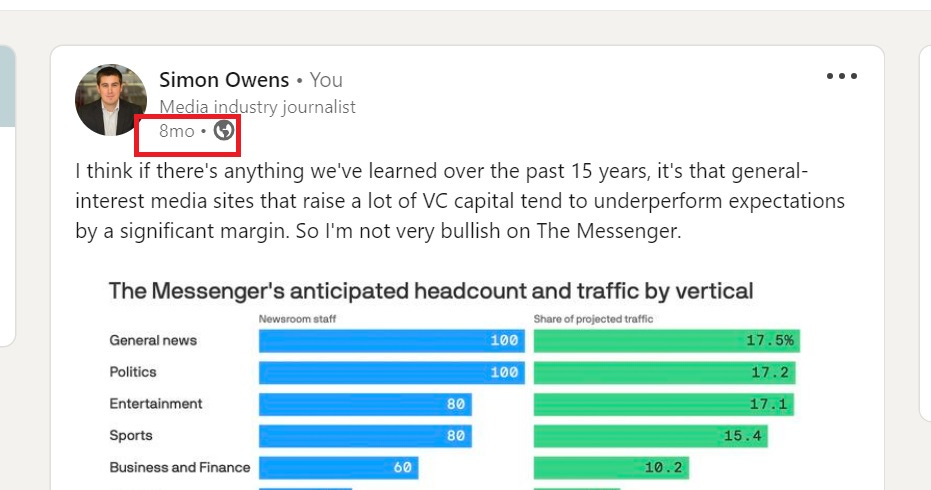The Messenger didn't learn the media lessons of the 2010s
The Messenger didn't learn the media lessons of the 2010sPLUS: Private equity backlash is fueling a local news resurgenceWelcome! I'm Simon Owens and this is my media industry newsletter. If you've received it, then you either subscribed or someone forwarded it to you. If you fit into the latter camp and want to subscribe, then you can click on this handy little button: Let’s jump into it… The Messenger didn't learn the media lessons of the 2010sThis week brought a torrent of bad news for The Messenger, the buzzy media startup founded last year by Jimmy Finkelstein. First The New York Times reported that the company was laying off about two dozen staffers in an effort to cut costs. Then Semafor scooped that the company’s board “weighed shutting the publication down at a meeting on Friday, after learning that the company is on track to run out of cash at the end of January.” And then finally Axios broke the news that The Messenger was trying to raise an additional $20 million in VC funding to keep the publication afloat. All this wasn’t exactly surprising; in fact, many took to social media to brag that they had predicted such an outcome when the outlet launched. And since I’m not above bragging, let me take a moment to plug this LinkedIn post I published eight months ago: OK, so we were all very prescient. But I think it’s probably helpful to reflect on why we were skeptical of a startup’s potential before it even debuted. After all, Finkelstein had a solid track record, having sold The Hill for an impressive $130 million. So why were we so sure that he couldn’t repeat this success? I don’t know about you, but for me the company’s plans — most of which were reported before its launch — went directly against the lessons we’d learned while watching so many 2010s-era startups crash and burn. From the very beginning, The Messenger felt like an anachronism, a repeat of many of the mistakes that had sunk several VC-funded media darlings just a few years ago. Let’s run through some of those mistakes: It made a play for audience scale If you go back and read coverage of the media startup scene in the early 2010s, it was largely based around the premise of infinite audience scale. This was around the time that Facebook, eager to court publishers, began promoting news stories within the Newsfeed and triggered hockey stick growth in every media outlet’s Chartbeat dashboard. There was this overwhelming assumption that this traffic scale would correspond with a gigantic boom in advertising revenue. We all know what happened next; not only did Facebook turn off the traffic spigot, but it also quickly became apparent that those drive-by readers weren’t all that valuable to advertisers. This left a lot of emperors with the stark realization that they weren’t wearing any clothes. By the time The Messenger launched last year, most of the media industry had moved on to prioritizing audience depth over scale, yet The Messenger seemed wholly focused pumping out hundreds of rewritten news items with the hope that some percentage of them would hit the viral lottery. “What was presented to me as the job and what the job was was two entirely different things," one former staffer told The Daily Beast. "I was told that this was going to be long-form journalism and all it was was aggregated content and clickbait, and to me, that’s not journalism." It reminded me of 2009-era Huffington Post. It raised too much money The Messenger famously raised $50 million pre-launch, and Finkelstein said he planned to use that money to hire hundreds of staffers. This immediately reminded me of the massive raises of VC darlings like Buzzfeed and Vice, both of which amassed huge overheads and then struggled once their cash infusions switched off. Most media startups today raise much smaller rounds. After all, the cost of launching a new media outlet is virtually zero, and most media entrepreneurs realize that they should first establish a product-market fit before they go and ask for more money. That’s why startups like Puck and Semafor have been hyper-focused on sustainable revenue growth, even as they’ve continued to raise more outside investment. By raising so much cash and establishing such a high burn rate, The Messenger virtually guaranteed that it would run into financial problems the moment that investment was spent. Its coverage is too broad The Messenger set out as a general interest news outlet, even though it’s long been apparent that there’s really no market viability for that sort of content. Outlets like HuffPost, Buzzfeed, and Vice have struggled for years to properly monetize their broad audiences with advertising, only to be met with bottom-of-the-barrel CPMs and diminishing returns. Meanwhile, many of the advertising-focused success stories of the last several years — outlets like Axios and Industry Dive — focused heavily on collecting first party data from their niche audiences. By now, the phrase “the riches are in the niches” is somewhat of a cliche, but that doesn’t make it any less true. Even outlets with ostensibly broad coverage areas — like Puck and Semafor — are focused on attracting more elite, educated readers. *** So is there an opportunity for The Messenger to course correct? I’m skeptical. The problem with starting out with so much overhead is that you don’t have much room to pivot once the resources dry up. Jimmy Finkelstein is a savvy media entrepreneur, and the outlet employs a lot of great journalists, but it’s difficult to recover from these kinds of early stumbles. As Rupert Murdoch learned with his iPad publication The Daily and Jeffrey Katzenberg learned with Quibi, sometimes you just have to admit that the market opening for your idea never existed in the first place. What do you think?
Will Buzzfeed file for bankruptcy in 2024?It’s been a bad few years for Buzzfeed. After a disastrous IPO in 2022, it’s faced a tanking stock price, declining revenue, and a shutdown of its news division. But things only look to get worse in 2024. As Adweek’s Mark Stenberg reports, BuzzFeed faces a fiscal cliff where it’s in danger of being delisted from the NASDAQ stock exchange, which then would trigger a required payment on its debt. Such an event would be disastrous for the company’s future. I recently interviewed Mark about the dangers of the fiscal cliff and how likely it is to happen. We also discussed all the early mistakes BuzzFeed made that led it to this predicament. Watch our discussion in the video embedded below:  If video embeds don’t work in your inbox, go here. If you want to listen to an audio version of this interview, subscribe to The Business of Content wherever you get your podcasts: [Apple] [Spotify] [Amazon Music] I’m looking for more media entrepreneurs to feature on my newsletter and podcastOne of the things I really pride myself on is that I don’t just focus this newsletter on covering the handful of mainstream media companies that every other industry outlet features. Instead, I go the extra mile to find and interview media entrepreneurs who have been quietly killing it behind the scenes. In most cases, the operators I feature have completely bootstrapped their outlets. In that vein, I’m looking for even more entrepreneurs to feature. Specifically, I’m looking for people succeeding in these areas:
Interested in speaking to me? You can find my contact info over here. (please don’t simply hit reply to this newsletter because that’ll go to a different email address. ) One area where AI is out-competing humansThe curators for Spotify's music playlists used to be an incredibly influential force in driving song streams, but they're becoming less and less relevant as AI-generated recommendations take over:
How Kelsey Ogletree built Pitchcraft, a membership community for PR prosHow do you write about the travel industry when people can’t fly on airplanes? That’s a question Kelsey Ogletree had to ask herself in 2020 at the beginning of the pandemic. By that point, she had worked for several years as a freelance travel writer, and like many of her colleagues, she didn’t know how the travel restrictions would affect her own career. So she decided to do something about it. She announced on her newsletter that she was hosting a live Zoom call about the future of the travel industry, and hundreds of people signed up to join her. That call was so successful, in fact, that she began hosting several more of them. Eventually, this ad hoc service grew into Pitchcraft, a paid membership community that costs thousands of dollars a year to join. In a recent interview I spoke to Kelsey and her husband Derrick about how they built their platform, what benefits they offer to paying members, and how they attract new customers. Watch our discussion in the video embedded below:  If video embeds don’t work in your inbox, go here. If you want to listen to an audio version of this interview, subscribe to The Business of Content wherever you get your podcasts: [Apple] [Spotify] [Amazon Music] Private equity backlash is fueling a local news resurgencePrivate equity's decimation of the news industry is inspiring media entrepreneurs all across the country to launch their own local news startups. Whenever a private equity firm like Alden Capital buys a legacy newspaper, it's often quickly followed with an announcement of a new nonprofit newsroom in the region:
Want a daily dose of media industry news?I only send this newsletter out twice a week, but I curate industry news on a daily basis. Follow me on one of these social platforms if you want your daily fix: You're currently a free subscriber to Simon Owens's Media Newsletter. For the full experience, upgrade your subscription. |
Older messages
Why a news bundle will never save the media industry
Wednesday, January 3, 2024
PLUS: Why publishers are doubling down on live events
Yet more evidence that Meta doesn’t understand the Creator Economy
Friday, December 15, 2023
PLUS: How Google's generative AI will impact search traffic
How a former travel journalist built a paid membership community for the PR industry
Friday, December 15, 2023
Kelsey and Derrick Ogletree designed Pitchcraft to serve as a liaison between PR consultants and journalists.
Morning Brew’s brilliant YouTube strategy
Tuesday, December 12, 2023
PLUS: Print magazines are the new vinyl?
How healthy is the podcast industry?
Friday, December 8, 2023
PLUS: The enduring legacy of Morning Brew and The Hustle
You Might Also Like
AI chatbots keep failing every accuracy test thrown at them
Wednesday, March 12, 2025
PLUS: Why Substack's new subscriber milestone is so significant ͏ ͏ ͏ ͏ ͏ ͏ ͏ ͏ ͏ ͏ ͏ ͏ ͏ ͏ ͏ ͏ ͏ ͏ ͏ ͏ ͏ ͏ ͏ ͏ ͏ ͏ ͏ ͏ ͏ ͏ ͏ ͏ ͏ ͏ ͏ ͏ ͏ ͏ ͏ ͏ ͏ ͏ ͏ ͏ ͏ ͏ ͏ ͏ ͏ ͏ ͏ ͏ ͏ ͏ ͏ ͏ ͏ ͏ ͏ ͏ ͏ ͏ ͏ ͏ ͏ ͏ ͏
Everything We’ve Written About That’s on Sale at Nordstrom
Wednesday, March 12, 2025
Plus: Actually cute plus-size maternity clothes. The Strategist Every product is independently selected by editors. If you buy something through our links, New York may earn an affiliate commission.
What A Day: Bad Car-ma
Tuesday, March 11, 2025
Elon Musk's politics are sparking a major Tesla backlash, ironically thanks to Trump. ͏ ͏ ͏ ͏ ͏ ͏ ͏ ͏ ͏ ͏ ͏ ͏ ͏ ͏ ͏ ͏ ͏ ͏ ͏ ͏ ͏ ͏ ͏ ͏ ͏ ͏ ͏ ͏ ͏ ͏ ͏ ͏ ͏ ͏ ͏ ͏ ͏ ͏ ͏ ͏ ͏ ͏ ͏ ͏ ͏ ͏ ͏ ͏ ͏ ͏ ͏ ͏ ͏ ͏ ͏ ͏
Rohingya refugees just lost half of their food aid. Now what?
Tuesday, March 11, 2025
An interview with Free Rohingya Coalition what happened last week in Asia, Africa and the Americas Hey, this is Sham Jaff, a freelance journalist focused on Asia, Africa and the Americas and your very
Shayne Coplan’s Big Bet Is Paying Off
Tuesday, March 11, 2025
March 11, 2025 THE MONEY GAME Shayne Coplan's Big Bet Is Paying Off By Jen Wieczner Photo: Dina Litovsky At 6 am on Wednesday, November 13, eight FBI agents in black windbreakers burst through the
We need your input.
Tuesday, March 11, 2025
Share your insights & receive a 70% off forever.
We Talkin’ About Practice?
Tuesday, March 11, 2025
Nobody Told Me There'd Be Days Like These ͏ ͏ ͏ ͏ ͏ ͏ ͏ ͏ ͏ ͏ ͏ ͏ ͏ ͏ ͏ ͏ ͏ ͏ ͏ ͏ ͏ ͏ ͏ ͏ ͏ ͏ ͏ ͏ ͏ ͏ ͏ ͏ ͏ ͏ ͏ ͏ ͏ ͏ ͏ ͏ ͏ ͏ ͏ ͏ ͏ ͏ ͏ ͏ ͏ ͏ ͏ ͏ ͏ ͏ ͏ ͏ ͏ ͏ ͏ ͏ ͏ ͏ ͏ ͏ ͏ ͏ ͏ ͏ ͏ ͏ ͏ ͏ ͏ ͏ ͏ ͏ ͏ ͏
Seattle startup takes eco-friendly aim at recycling clothing
Tuesday, March 11, 2025
Read AI rolls out enterprise search tool | Hard time for hardware ADVERTISEMENT GeekWire SPONSOR MESSAGE: A limited number of table sponsorships are available at the 2025 GeekWire Awards: Secure your
☕ The beauty of it all
Tuesday, March 11, 2025
A conversation with Ulta Beauty's CMO. March 11, 2025 View Online | Sign Up Marketing Brew Presented By Iterable It's Tuesday. Count Kathy Hochul as an ad buyer. The governor of New York is
🤔 What’s in your wallet? A scam.
Tuesday, March 11, 2025
Plus, a new streaming deal is the latest gift to Trump from the billionaire CEO and his company — which profits off government contracts. Forward this email to others so they can sign up 🔥 Today on

